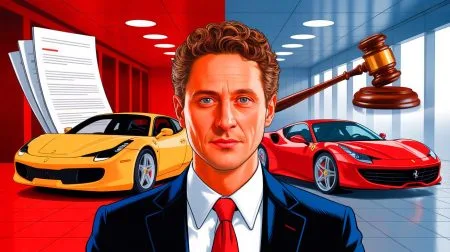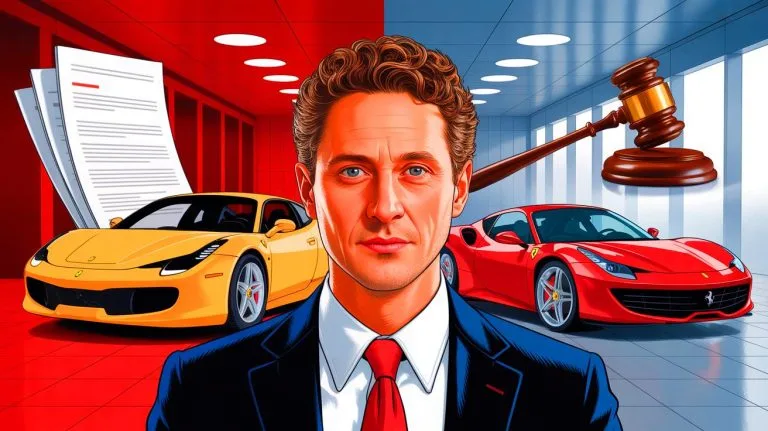| IN A NUTSHELL |
|
John Elkann, a prominent figure in the automotive industry, finds himself at the center of a complex legal and financial situation. As the chairman of both Stellantis and Ferrari, Elkann is navigating a tax fraud investigation linked to his grandmother Marella Caracciolo’s inheritance. Marella was the widow of Gianni Agnelli, the former head of Fiat who passed away in 2003. Elkann’s strategy to address these allegations is unconventional, involving a potential year of community service as part of a legal arrangement that allows him to avoid criminal charges, pending judicial approval.
Legal Maneuver: Community Service in Exchange for Immunity
In a move permitted by Italian law, John Elkann is negotiating a “probationary period” that could exempt him from criminal prosecution related to the inheritance case. The Turin prosecutor’s office announced on September 8 that this agreement, once validated by a judge, would require Elkann to perform community service in Italy. This service might involve assisting in a center for the elderly or working at a rehabilitation facility for drug addicts. This arrangement highlights the adaptability of Italian legal mechanisms in resolving complex financial disputes without resorting to lengthy court battles.
Understanding the origins of this legal entanglement is crucial. The inheritance of Gianni Agnelli, valued at approximately $1.2 billion, has been a source of familial and legal discord. Elkann’s mother, Margherita, argues that the settlement reached in 2004 was unfair, particularly to her five children from a second marriage. This dispute underscores the challenges inherent in managing vast family fortunes, where personal and financial interests often collide.
Stellantis Faces Financial Turmoil
While Elkann grapples with personal legal issues, Stellantis, the global automotive giant he chairs, is confronting significant financial challenges. The company reported a net loss of €2.3 billion (approximately $2.7 billion) in the first half of 2025, a stark indicator of its current economic struggles. This downturn is occurring amidst a backdrop of broader industry shifts, including supply chain disruptions and evolving market demands.
In contrast, Ferrari, under the leadership of CEO Benedetto Vigna, is experiencing a period of financial growth. The luxury automaker’s revenue increased by 9% in the first six months of the year, reaching €3.578 billion ($3.85 billion). This divergence between Stellantis and Ferrari highlights the varying impacts of market conditions on different sectors within the automotive industry. The contrasting fortunes of these two companies under Elkann’s leadership raise questions about strategic decision-making and the ability to adapt to rapidly changing economic landscapes.
Volkswagen Unleashes Its Own Epic Gymkhana Video – A Thrilling Ride!
Implications of the Legal Agreement
The legal resolution Elkann is pursuing not only impacts his personal standing but also has broader implications for corporate governance and accountability. By opting for community service, Elkann is leveraging a legal provision that allows individuals to mitigate potential legal repercussions through socially beneficial activities. This approach reflects a pragmatic recognition of the legal challenges while maintaining a focus on broader contributions to community welfare.
However, this strategy also raises questions about the equitable application of justice and the extent to which influential figures can navigate legal systems differently. The outcome of this case could set precedents for how similar cases are handled in the future, particularly concerning high-profile individuals with significant financial and social influence. It invites a broader discussion on the balance between personal accountability and the flexibility of legal frameworks in addressing complex financial disputes.
The Broader Context of Corporate Leadership
Elkann’s situation underscores the multifaceted responsibilities of corporate leaders in today’s world. Beyond managing business operations, leaders are increasingly required to navigate legal, ethical, and social challenges that have far-reaching implications for their companies and personal reputations. This case highlights the intersection of personal and professional spheres, where decisions made in one domain can have significant repercussions in the other.
The ability to effectively manage these challenges is becoming an essential skill for modern executives. As Elkann’s case unfolds, it will be closely watched by industry observers, legal experts, and the public. The resolution of this case will likely influence perceptions of leadership accountability and the evolving role of corporate leaders in addressing complex legal and ethical issues.
As John Elkann navigates these turbulent waters, the outcomes of his legal and financial maneuvers will have lasting implications for his legacy and the companies he leads. This situation prompts a critical examination of the mechanisms available to resolve such high-stakes disputes and the broader impacts on corporate governance. How will this case influence the future of leadership accountability in the corporate world?
Did you like it? 4.5/5 (26)








Isn’t it ironic how community service is considered a punishment when it’s actually beneficial for society? 🤔
How is this even legal? 🤔